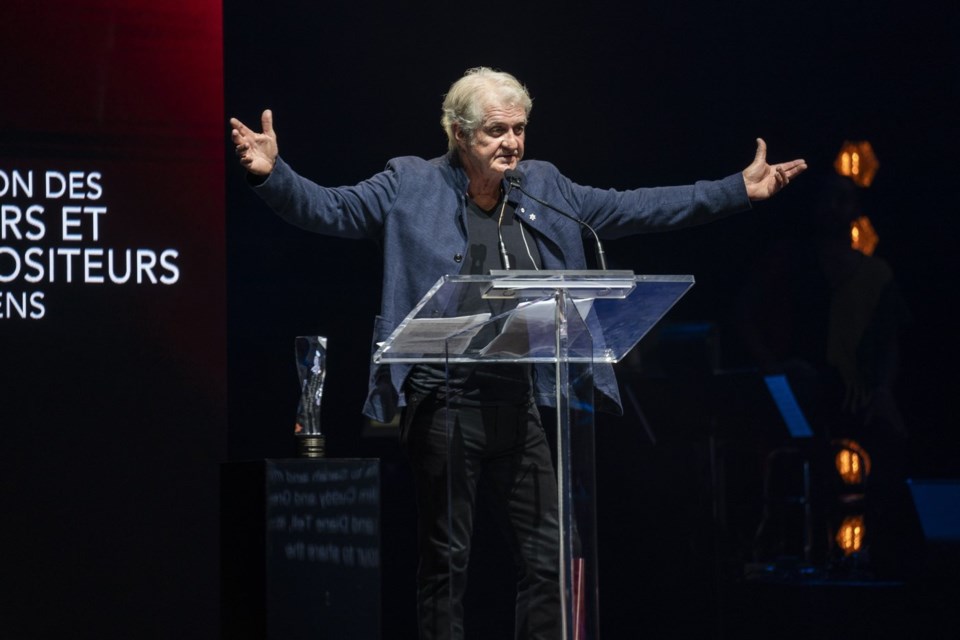TORONTO — As Sarah McLachlan, Tom Cochrane and members of Blue Rodeo were ushered into the Canadian Songwriters Hall of Fame on Saturday, each took a moment to recognize that writing great music usually comes with incredible struggle.
“Writing is often a lonely, isolating business,” McLachlan told the audience at Toronto's Massey Hall in her speech.
“But for me, it’s also extremely cathartic.”
Her feelings were shared by Cochrane, who acknowledged that songwriting steals precious years away from the people around its creators. He thanked his daughters for their patience with him.
But the "Life is a Highway" writer suggested the creation process often leads to miracles.
“Songs have a beginning and an end – like lives,” he said. “And like the people we love, we don’t forget them.”
All of the inductees' famous tunes punctuated an evening show that saw fans dancing from their seats as Sam Roberts, Metric and Lights joined others in tributes that spanned the emotions.
Husband-and-wife duo Whitehorse delivered a sombre acoustic-electric take on McLachlan's "Sweet Surrender" while a barefoot Brett Emmons of the Glorious Sons threw his voice into a wailing version of Cochrane's "Big League."
Nelly Furtado shared how McLachlan inspired her early in her career as they wound through one of the Lilith Fair tours. She also praised McLachlan's tireless efforts in raising funds for various charities.
The two finished by performing a harmonious duet of Angel with Furtado standing near McLachlan's piano.
Aside from the deeper reflections on the struggle of creation, the night offered a good share of humour, particularly when it came to the induction of Blue Rodeo songwriters Jim Cuddy and Greg Keelor.
Ed Robertson of Barenaked Ladies, appearing in a video message, likened the pair to being as inseparable as maple syrup and pancakes.
Keelor kept the jokes flowing when he stepped up to the podium with a thick notepad of his handwritten speech. He assured the crowd it wasn't as long as it looked.
Shortly after, he pointed out McLachlan as she watched from the crowd beside her daughter Taja.
“I once said, way back, that when I die, I want Sarah McLachlan to sing at my grave,” he said.
“So I think I will die in my seat tonight.”
Country artists Tim Hicks and Tenille Townes gave a colourful tribute to Blue Rodeo that was quite literal.
When they hit the stage to sing a growling take on “Til I Am Myself Again,” both were dressed in blue – Hicks in a blue jean jacket and Townes in blue leather pants.
Toronto singer Ahi toasted the country-rock band with a bluesy take on “Try" that earned the praise of Cuddy as he kicked off his induction speech.
The Blue Rodeo frontman said all of the celebration was overwhelming in some ways. He thanked his wife, actress Rena Polley, for her unwavering support.
“Every time we go to a concert, or every time I play her a record, I’m just still surprised by all her enthusiasm, I think really after 40 years? That’s amazing,” he said.
Other highlights of the evening included French-Canadian chanteuse La Zara, who represented France at the 2023 Eurovision Song Contest. She was among the performers who toasted Quebec singer Diane Tell with a sizzling rendition of her 1981 song “Si J’etais un Homme,” which translates as “If I Were a Man.”
Accepting her honour, Tell recalled how she penned around 50 songs while barely a teenager and would sing them “for anyone who cared to listen.”
She said songwriting was invaluable to her life, and the words she wrote were so important to her that even in her early days she had an “urge to own my music and protect it from the industry.”
“Those songs they are my anchor,” she added.
Gary LeVox of the Nashville band Rascal Flatts closed the evening by joining a harmonica-clutching Cochrane on "Life is a Highway." Partway through the song, all of the evening's performers returned to the stage to rock out together.
"You just always hope and pray that one of your songs is timeless," LeVox said of showing up for Cochrane's induction.
"And great songs like that just get rewarded."
This report by The Canadian Press was first published Sept. 28, 2024.
David Friend, The Canadian Press


